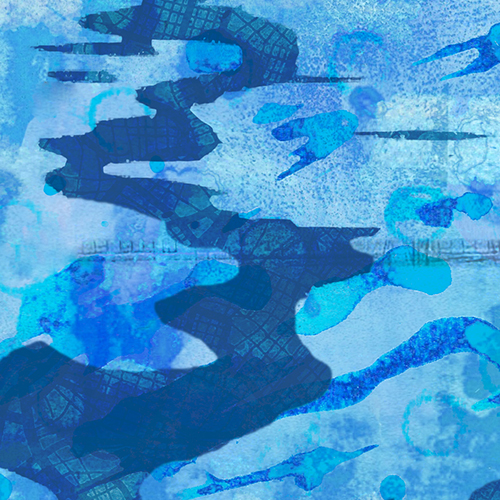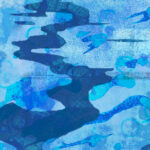Vanishing Point & Lozenge
Flash Fiction
by Tom Vowler
Vanishing Point
After your father ran off with his student and your mum ended herself as Plath had, I called at your flat, marshalled clothes onto you and headed to places I’d slayed my own grief. God’s own landscapes, I’d heard them called, terrain the poets and lovers had colonised. Look, I said, what torment can sustain itself in the presence of this? But you just stood there, a skeleton languishing in its own skin. Beauty, I saw, would become your tormentor, so I lured you into the city’s underbelly, hinterlands where the marginalised dwelt. We loitered with junkies, the homeless, the sick and the relegated. These glimpses of squalor, however, acted not as cautionary tales, but as lures, as a potential blueprint for you.
I gave up the tenancy on my apartment and moved my belongings into yours, the neighbour who’d smiled so effusively before, now issuing atrophying glares on realising we were a couple of queers. After cradling your body for an entire afternoon, I phoned in sick for you, told your boss you were extremely infectious, lest she send any scouts snooping around. I took control of your finances and within a week you became a marionette, incapable of autonomy, content to relinquish all of life’s decisions.
I forked food into you, watched as you let it break down in your mouth before mustering a swallow. Sometimes I’d go heavy on salt or chilli, just to illicit a reaction, but you remained impassive, the grief manifest in your body as well as your mind now. I withheld food, sometimes for the whole day, waiting for some corporeal entreaty that never came. I bathed you, raising and lowering limbs in twice-weekly ablutions, tilting your head back to keep the shampoo from your eyes. I read to you at bedtime, texts I thought might undermine your descent, stories to rouse and tantalise.
One Tuesday I drove us through the car wash on acid, our faces pressed to the windows of my Peugeot as mosaics of suds dissolved our egos. My fear that psychedelics could spiral you into a maze of psychosis proved unfounded, and although it never lasted, it was in these times I witnessed flickers of you returning.
I wrote to your father, attempting a reconciliation I didn’t think he deserved. He replied with two salvos: 1) that he always suspected you were a lesbian; 2) there would be nothing left in his estate for you.
I first noticed the colour leaching from you after we swam in the sea; not that you moved beyond the swell raising and lowering your body like a buoy. Whereas the blood returned to my own skin on the shore, yours retained its sallowness until I sat you by the radiator at home. I apologised for not feeding you properly, ordered the most vibrant food I could find, until the interior of the fridge resembled a rainbow. But each day you appeared more and more like a grainy photograph, an approximation of yourself. Washing you one night I swear I could see the surface of the bath through you.
This has to stop! I yelled with all the volume I could assemble, and the notes of terror or love in my voice must have broken through, as you looked at me for the first time in a week and nodded.
Lozenge
Foraging for morels in the woods last week he’d come across a wild boar piglet, the wretched thing perhaps four or five days old, its umbilical cord still attached. He assumed the mother had been shot by a hunter, sensed the animal was hours from death. He looked around for a hunk of wood, something with length so he could distance himself a little from the act. In the end he realised he had neither the mettle to remove its misery, nor the indifference to abandon it. And so he had carried it down to the house, this honey- and caramel-striped lozenge, cradling it as one would a baby, the creature with no strength to protest. Inside he found an old crate, in which he lay some blankets and a bowl of water. He attached a cable-tie to the umbilical cord and cut just below it.
He expected to find it dead the following morning, but there was life still there, and so he took the laptop outside and searched for what to do next. A website that rescued young boars listed a milk formula used for lambs and young goats, so he drove to the agricultural store, where he also bought a feeding bottle. An hour later he was sitting in the crate as the animal suckled frantically, one bottle then another, and he wondered how a sow’s nipples could withstand such trauma.
He put a tray with some gravel in one corner and got on with the day’s tasks. By lunchtime the animal had perked up and seemed calm in his presence, and a day later he cut a hole in the crate so it could come and go, which it did, the clip of its trotters like dainty heels on the flagstones as it shadowed him. To his surprise it took to using the litter tray. The more he hand-fed the animal, the more he realised returning it to the wild would be unfeasible, the absence of fear for humans, for those who would aim a rifle at it. He vowed to build a pen in the field, somewhere hidden from the road as it was illegal to keep a wild creature as a pet.
When the children returned from far-flung universities for the summer, the creature took to following them around the property, grafting itself to the family. He watched as they tried teaching it to fetch a ball, gave up protesting when they fed it from the table. He’d tell them about his diagnosis another time, before they left for their mother’s, or when they came for Christmas. For now it seemed right only to let the laughter reside.

About the Author
Tom Vowler is an award-winning novelist and short story writer living in the UK. A university lecturer with a PhD in creative writing, his work has featured on BBC radio and been translated into multiple languages. His forthcoming book is a collection of flash fiction and he is currently writing a memoir. Visit Tom’s website or follow him on Twitter.


